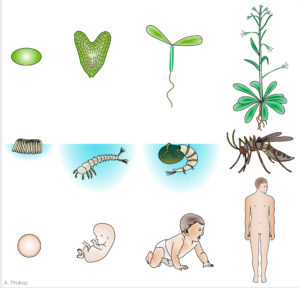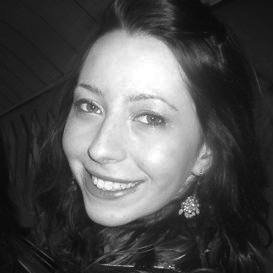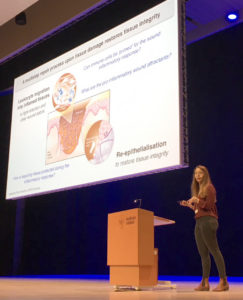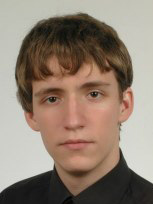 The BSDB recently initiated an advocacy campaign, starting with (1) the gradual development of the best arguments providing elevator pitches to be used in discussions, presentations, applications or publications, and (2) the collation of support resources which were first published on the BSDB website and are now present in improved version on The Node. To take this initiative a step further, I recently took an invitation by the journal Open Access Government as an incentive to write a short text that would explain the nature as well as the societal importance and impact of DB in terms that are understandable to lay audiences. Please, read the outcome of that effort here. Please note that this is only a first attempt, but I hope that it will serve as a template that can be used and further developed by members of the DB community.
The BSDB recently initiated an advocacy campaign, starting with (1) the gradual development of the best arguments providing elevator pitches to be used in discussions, presentations, applications or publications, and (2) the collation of support resources which were first published on the BSDB website and are now present in improved version on The Node. To take this initiative a step further, I recently took an invitation by the journal Open Access Government as an incentive to write a short text that would explain the nature as well as the societal importance and impact of DB in terms that are understandable to lay audiences. Please, read the outcome of that effort here. Please note that this is only a first attempt, but I hope that it will serve as a template that can be used and further developed by members of the DB community.
Category Archives: News
Helen Weavers – Dennis Summerbell Awardee 2017
 Following a generous donation, the BSDB has instituted the Dennis Summerbell Lecture, to be delivered at its annual Autumn Meeting by a junior researcher at either PhD or Post-doctoral level. The 2017 lecture awardee was Helen Weavers (School of Biochemistry, Faculty of Biomedical Sciences, University of Bristol) with her submitted abstract “Understanding the inflammatory response to tissue damage in Drosophila: a complex interplay of pro-inflammatory attractant signals, developmental priming and tissue cyto-protection”. Her award lecture was presented at the Autumn Meeting 2017, jointly organised by the BSDB together with the Swedish, Finish, Norwegian and Danish Societies of Developmental Biology, 25-27 October 2017 in Stockholm.
Following a generous donation, the BSDB has instituted the Dennis Summerbell Lecture, to be delivered at its annual Autumn Meeting by a junior researcher at either PhD or Post-doctoral level. The 2017 lecture awardee was Helen Weavers (School of Biochemistry, Faculty of Biomedical Sciences, University of Bristol) with her submitted abstract “Understanding the inflammatory response to tissue damage in Drosophila: a complex interplay of pro-inflammatory attractant signals, developmental priming and tissue cyto-protection”. Her award lecture was presented at the Autumn Meeting 2017, jointly organised by the BSDB together with the Swedish, Finish, Norwegian and Danish Societies of Developmental Biology, 25-27 October 2017 in Stockholm.Helen’s work so far
After completing her PhD studies investigating Drosophila nephrogenesis in Helen Skaer’s lab in Cambridge, Helen moved to Bristol in 2013 to take up a 5 year, MRC-funded post-doc position between Paul Martin’s and Will Wood’s labs. Her first publication from this work (Weavers et al., 2016, Cell 165, 1658ff.), showed that Drosophila macrophages (haemocytes), must first be “primed” by engulfing at least one dead cell, before they are responsive to wound attractants. These findings are important because the majority of human pathologies are a consequence of too little or too much inflammation. What really excited the judges of the Denis Summberbell Lecture award was the work which had led to her most recent paper entitled “Systems Analysis of the Dynamic Inflammatory Response to Tissue Damage Reveals Spatiotemporal Properties of the Wound Attractant Gradient” (Weavers et al., 2016, Curr Biol 26, 1974ff.). This was a true multidisciplinary study, using a combined approach of mathematics and biology to analyse macrophage behaviours in response to tissue damage. Although the identity of the wound attractant signal/s are still not clear, this study was able to determine several of the characteristics of the attractant(s). Building on this strong platform of work, Helen is currently developing her own research towards understanding tissue protection/resilience in Drosophila and man, and this was an exciting novel element of her award lecture. In her talk, she described in a stunningly visual and understandable way how successful tissue repair relies not only on the host’s ability to mount an effective inflammatory response, but also on its ability to limit it. Her talk was a fabulous highlight and a shining example of high quality research by members of the BSDB.
Lecture abstract:
 Understanding the inflammatory response to tissue damage in Drosophila: a complex interplay of pro-inflammatory attractant signals, developmental priming and tissue cyto-protection
Understanding the inflammatory response to tissue damage in Drosophila: a complex interplay of pro-inflammatory attractant signals, developmental priming and tissue cyto-protection
Helen Weavers, Bristol, UK
An effective inflammatory response is pivotal to fight infection, clear debris and orchestrate the repair of injured tissues; however, inflammation must be tightly regulated since many human disease pathologies are a consequence of inflammation gone awry. Using a genetically tractable Drosophila model, I use precise genetic manipulation, live imaging and computational modelling to dissect the mechanisms that activate the inflammatory response to tissue damage and those that simultaneously protect the regenerating tissue from immunopathology. Upon tissue damage, immune cells (particularly neutrophils and macrophages) are recruited into the damaged area by damage signals (danger-associated molecular patterns, DAMPs) released from the injured tissue. In collaboration with computational biologists, we employ a sophisticated Bayesian statistical approach to uncover novel details of the pro-inflammatory wound attractants, by analysing the spatio-temporal behaviour of Drosophila immune cells as they respond to wounds. We show that the wound attractant is released by wound edge cells and spreads slowly through the tissue, at rates far slower than small molecule DAMPs such as ATP and H2O2. Strikingly, we also find that immune cells must be developmentally ‘primed’ by uptake of apoptotic corpses before they can respond to these damage attractant signals. Such corpse-induced priming is an example of “innate immune memory” and may serve to amplify the inflammatory response in situations involving excessive cell death – and otherwise limit an overzealous and damaging immune response. Indeed, whilst inflammation is clearly beneficial, toxic molecules (e.g. reactive oxygen species, ROS) generated by immune cells to fight infection, can also cause significant bystander damage to host tissue and delay repair – and may underpin chronic wound-healing pathologies in the clinic. To counter this, I find that wounded Drosophila tissue employs a complex network of cyto-protective pathways that promote tissue ‘resilience’, which both protect against ROS-induced damage and stimulate damage repair. Successful tissue repair, therefore, not only relies on the host’s ability to mount an effective inflammatory response, but also its ability to finely tune it and limit associated immunopathology.
Iwo Kucinski – Dennis Summerbell Lecture awardee 2016
 Following a generous donation, the BSDB has instituted the Dennis Summerbell Lecture, to be delivered at its annual Autumn Meeting by a junior researcher at either PhD or Post-doctoral level. The inaugural Dennis Summerbell Lecture was given by Iwo Kucinski at the 2016 BSDB Autumn Meeting. His work was carried out in Eugenia Piddin’s laboratory at the Gurdon Institute, University of Cambridge. The lecture was entitled “The molecular signature of the loser cell status reveals key pathways regulating cell competition”.
Following a generous donation, the BSDB has instituted the Dennis Summerbell Lecture, to be delivered at its annual Autumn Meeting by a junior researcher at either PhD or Post-doctoral level. The inaugural Dennis Summerbell Lecture was given by Iwo Kucinski at the 2016 BSDB Autumn Meeting. His work was carried out in Eugenia Piddin’s laboratory at the Gurdon Institute, University of Cambridge. The lecture was entitled “The molecular signature of the loser cell status reveals key pathways regulating cell competition”.
Abstract:
Cell competition is a process conceptually similar to natural selection at the cellular level. In this process a population of less fit cells (losers) is sacrificed and eliminated by a population of fitter cells (winners), with the ultimate goal of maximising tissue and organism fitness. This mechanism has been proposed to play a role in tissue health and turnover and in disease states such as cancer. Despite its discovery four decades ago and increasing examples of mutations inducing the loser status, the molecular properties that earmark cells as losers have not been identified.We identified molecular differences between winner and loser cells through comparative transcriptomics of two seemingly functionally unrelated mutations, which share the loser phenotype: Minute heterozygous mutations (ribosomal defect) and a mutation in mahj (involved in cell polarity and protein degradation). This revealed a molecular signature composed of a core set of genes that are differentially expressed specifically in loser cells.Through subsequent functional analysis we found that three components of this signature play an important role in controlling proliferation and cell death during cell competition. First, loser cells chronically activate JNK signaling, which restricts their intrinsic growth rate. Secondly, the constitutive activation of JAK/STAT pathway promotes proliferation of loser cells but also nonautonomously fuels the expansion of competing wild-type cells, boosting cell competition. Thirdly, we find that chronic activation of Nrf2 induces the oxidative stress response and that this serves a dual purpose: it promotes survival of loser cells on their own, but it is also sufficient to trigger their elimination when they are confronted by wild-type cells. Altogether these findings provide important new mechanistic insight on how cell competition occurs.
Writing competition for PhDs & postdocs
In preparation of our upcoming 70th anniversary to be celebrated at the special Spring Meeting in Warwick (April 15th-18th 2018), the BSDB announces a writing competition for its graduate student and postdoc members. We are curious to hear about your thoughts (in not more than 500 words) on one of the following topics:
- The future of Developmental Biology
- What Developmental Biology has contributed to society
- The experiment/paper in Developmental Biology that most inspired you

Further details of the competition will be formally announced shortly, but we thought it might help if we give you some head-start. The deadline will be Sunday, 4th of March 2018, and the winner is going to be announced at the Spring Meeting. The first prize is a free trip to and attendance of the 77th Annual Society of Developmental Biology meeting in Portland, Oregon, USA.
If you have any questions or would like to submit your essays, please contact Alex at students@bsdb.org or Michelle at postdocs@bsdb.org.
New BSDB website for junior members providing career advice
If you are a junior BSDB member, please see our separate website providing support for academic and non-academic careers, clearly illustrating why the BSDB is such a great society!
The website was initiated by our postdoc representative Michelle Ware (group of Jenny Morton in Cambridge; 2015-18) and PhD representative Alexandra Ashcroft (group of Anne Ferguson-Smith in Cambridge; 2015-18) on the basis of feedback obtained via the 2015 survey of student and postdoc BSDB members. To make sure that the page continues to serve your needs and expectations, please don’t hesitate to send in your ideas, corrections and feedback. Simply write to students@bsdb.org or postdocs@bsdb.org.
Brief summary of the BSDB PhD/postdoc site:
- Advice for a successful academic career
- Funding lists for postdoctoral research, starting your own group or PhD studentships
- Eminent developmental biologists are sharing their Career stories to elucidate the rationale behind their decisions
- Society members provide snapshot Timelines to demonstrate the multitudes of routes to running your own group. These lists are unique in that successful members of our society have offered themselves up as “advisors” to the community. They will answer questions about the process of a given application.
- Our Toolkit page (under construction) will highlight the academic skills uniquely gained in Developmental Biology.
- Advice for those looking to leave academia
- Developmental Biologists who left the field share their Career stories to show the breadth of what’s possible, and how to get there
- Our Toolkit page (under construction) will highlight the transferable skills uniquely gained in Developmental Biology
- CV Boosters page (under construction)
- will offer advice on Consulting, Entrepreneurship, Public Engagement, Science communication and Science Policy
- Events
- alerts to our upcoming career events and looks back at past events we organised
Why not just visit our PhD/postdoc website and see for yourself?
